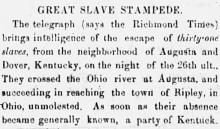GREAT SLAVE STAMPEDE.
The telegraph (says the Richmond Times) brings intelligence of the scale of thirty-one slaves, from the neighborhood of Augusta and Dover, Kentucky, on the night of the 26th ult., They crossed the Ohio river at Augusta, and succeeded in reaching the town of Ripley, in Ohio, unmolested. As soon as their absence became generally known, a party of Kentuckians, consisting mainly of owners of the negroes, started in pursuit. No difficulty was experienced in tracing the fugitives to Ripley, at which place a large amount of clothing, taken by the same runaways, was found concealed in a yard.
The presence of the fugitives and their pursuers, created great excitement in Ripley, especially among the resident blacks; and the authorities refused to grant a warrant to search the house in which it was supposed most of the slaves were harboured. Five of the runaways however, who continued on beyond the town, were pursued by their masters and then captured.
The Kentuckians, nothing daunted by the hostile demonstrations they encountered on every side, determined to remain in Ripley and capture their negroes. As soon as this determination became known, the negroes living in the place assembled in large numbers, armed with guns, &c. and surrounded the hotel where the Kentuckians stopped. Affairs had thus assumed a most threatening aspect at last accounts and great fears were entertained of a serious disturbance––if not a bloody encounter.
Intelligence of the refusal of the authorities of the town of Ripley to assist in the capture of the fugitives by granting warrants, had been received in Maysville, Ky. and had created the utmost indignation.
This monstrous outrage is well calculated to create great excitement throughout the whole State of Kentucky; and we should not be surprised to learn that the slave owners had been reinforced by sufficient numbers of their friends and neighbors to enable them to crush the black armed mob who thus dare to outrage the law of the land.
"Great Slave Stampede," Raleigh (NC) North Carolina Star, October 6, 1852, p. 2

